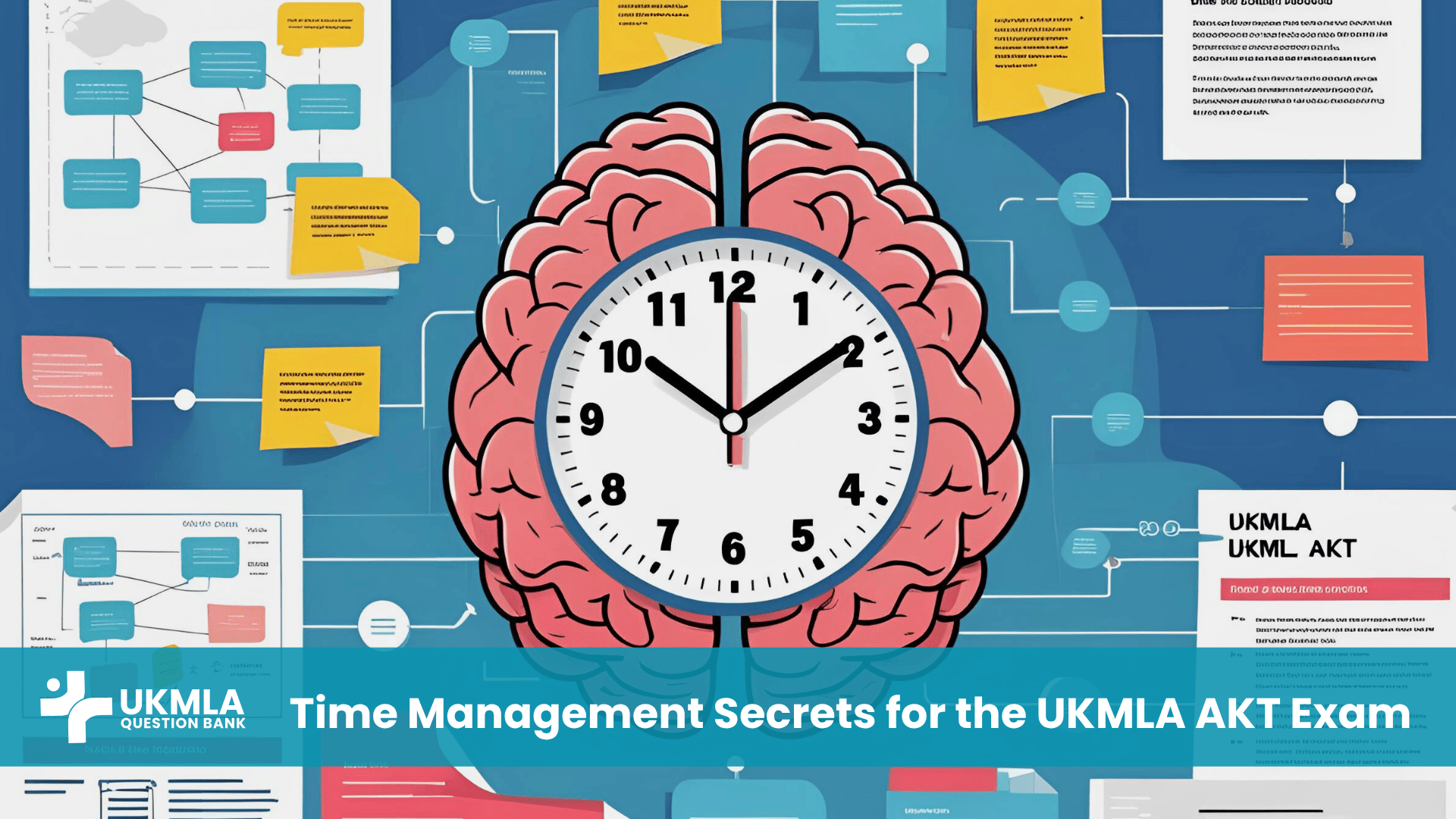Time Management Secrets for the UKMLA AKT Exam
In the high-stakes environment of the UKMLA Applied Knowledge Test (AKT), your medical knowledge is only one part of the equation. The other, equally critical component, is your ability to apply that knowledge under intense time pressure. Many highly knowledgeable candidates underperform simply because they fail to master the clock. Effective UKMLA AKT time management is not just a desirable skill; it is a fundamental pillar of success that can be the difference between a pass and a fail, or a good score and a great one.
This guide reveals the essential secrets to mastering UKMLA AKT time management. We will move beyond simple advice like “work faster” and provide you with a strategic framework for preparing before the exam and executing flawlessly on the day. From calculating your ideal pace to employing advanced triage techniques and avoiding common time traps, these insights will help you take control of the exam clock. By developing a robust approach to UKMLA AKT time management, you can ensure you have the opportunity to answer every question to the best of your ability.
Key Takeaways
Before we dive into the secrets, here are the core principles for exceptional UKMLA AKT time management:
Know Your Pace: Calculate your target time per question and train yourself to stick to it through consistent practice.
Practice Under Pressure: Regularly completing timed question blocks and full mock exams is non-negotiable for building speed and stamina.
Triage Your Questions: Develop a system to quickly categorize questions as easy, medium, or hard, allowing you to secure easy marks first.
Use the Flag System Wisely: Flagging questions is a key part of UKMLA AKT time management, but it requires a strategy to avoid creating a time-consuming backlog.
Don’t Fear the Educated Guess: Learn to recognize when a question is taking too long and make a strategic guess to preserve time for other questions.
Analyze Time Sinks: During practice, identify the types of questions or topics that consistently slow you down and address them.
Control Your Review Time: Allocate a specific, non-negotiable amount of time at the end for reviewing flagged questions, not for second-guessing everything.
Understanding the Time Challenge of the UKMLA AKT
Mastering UKMLA AKT time management begins with a clear understanding of the challenge. The exam is a marathon of focused thinking, and the clock is a constant, unforgiving companion.
The Exam Structure and Its Demands on Your Pace
The UKMLA AKT consists of a large number of Single Best Answer (SBA) questions to be completed in a fixed timeframe. This structure intentionally creates a pressure environment where you must work both quickly and accurately. The sheer volume of questions means there is no time to linger. Each question, with its clinical vignette, requires you to read, analyze, reason, and select an answer in what often amounts to less than two minutes.
This relentless pace demands more than just knowledge; it demands cognitive efficiency. Your UKMLA AKT time management strategy must account for reading speed, analytical speed, and decision-making speed, all while maintaining high accuracy.
Why Speed Without Accuracy is a Failing Strategy
It can be tempting to rush through questions to ensure you finish, but this is a classic pitfall. Answering every question incorrectly because you missed key details is worse than not finishing the last few. The goal of UKMLA AKT time management is not just completion; it’s maximizing your correct answers.
Highlight: Effective UKMLA AKT time management is about finding the optimal balance between speed and accuracy, ensuring you move quickly enough to finish but carefully enough to make sound clinical judgments. This balance is honed through deliberate, timed practice where you focus on both the timer and the quality of your answers.
The Psychological Impact of the Countdown Clock
The constant presence of a ticking clock can induce anxiety, leading to panic and poor decision-making. This can create a negative feedback loop: anxiety slows you down, which increases your anxiety about the time, and so on. A key “secret” to successful UKMLA AKT time management is developing a resilient mindset.
By practicing under exam conditions, you desensitize yourself to this pressure. You learn to see the clock not as an adversary, but as a tool to guide your pacing. This mental reframing is crucial for maintaining the calm, focused state of mind needed to perform at your peak.
Foundational Strategies for Effective UKMLA AKT Time Management
Excellent UKMLA AKT time management on exam day is built upon a foundation of smart preparation. These strategies should be a core part of your study plan from the very beginning.
Calculating and Internalizing Your Average Time Per Question
This is the most fundamental step. Divide the total exam time (in seconds) by the total number of questions. This gives you your average time per question. For example, if an exam has 150 questions in 3 hours (180 minutes or 10,800 seconds), your average time is 72 seconds per question.
Knowing this number is powerful. During practice, you can check your progress against this benchmark. Are you consistently taking 90 seconds on questions you should be answering in 70? This data helps you identify inefficiencies in your process and train your internal clock to the required pace for optimal UKMLA AKT time management.
The Power of Timed Practice and Mock Exams
You cannot learn to swim without getting in the water. Similarly, you cannot master UKMLA AKT time management without relentless timed practice.
Incorporate timed blocks into every study session: Don’t just answer questions casually. Set a timer for a block of 10, 20, or 50 questions based on your calculated average time.
Regularly sit full-length mock exams: This is the only way to simulate the mental fatigue and sustained focus required for the real exam.
Our article “UKMLA Mock Exams: Your Ultimate Key to Unlocking Top Scores…” provides a deeper dive into how to leverage these essential tools for your UKMLA AKT time management practice.
Building Mental Stamina for Sustained Focus
The UKMLA AKT is a test of endurance. Your ability to think clearly can degrade over several hours. Building mental stamina is a key, often overlooked, aspect of UKMLA AKT time management.
Practice in longer, focused blocks: Gradually increase the duration of your timed practice sessions.
Optimize your physical state: Ensure adequate sleep, nutrition, and hydration during your preparation period.
Practice mindfulness: Techniques like meditation can improve your ability to maintain focus and manage cognitive fatigue.
“The challenge of a lengthy exam is not just answering the last question, but answering the last question with the same clarity and precision as you answered the first.” – (Attributed to an academic performance coach).
Preparation Phase | Key UKMLA AKT Time Management Activity | Primary Goal |
|---|---|---|
Early Prep | Calculate average time per question. | Establish a baseline pace for all practice. |
Mid-Prep | Consistently practice with timed question blocks. | Train your internal clock and improve question-answering efficiency. |
Late Prep | Sit multiple full-length, timed mock exams. | Build mental stamina and simulate the full exam day experience. |
Advanced Pacing Techniques for Exam Day
With a strong foundation of practice, you can employ more advanced strategies on exam day to optimize your UKMLA AKT time management.
The ‘Triage’ Method: Easy, Medium, and Hard Questions
Not all questions are created equal. Some you will know instantly; others will require more thought. A triage system helps you manage this variability:
Easy: If you read the question and know the answer with high confidence, answer it immediately (e.g., in < 60 seconds). This banks time.
Medium: If you’re fairly confident but need to think through the options or do a quick mental check, take your allotted average time (e.g., 60-90 seconds).
Hard: If you read the question and are unsure, or you know it will require complex reasoning, spend no more than your average time on an initial attempt. If you’re still stuck, use the flag system.
This approach ensures you capture all the “low-hanging fruit” early on and don’t get bogged down by a single difficult question at the expense of several easier ones.
Utilizing the Flagging System Strategically
The “flag for review” feature is a powerful tool for UKMLA AKT time management, but it can also be a trap if used improperly. A good strategy is key:
Flag sparingly: Only flag questions you genuinely think you can answer with a little more time. Don’t flag every question you’re slightly unsure about.
Answer before flagging: Never leave a flagged question blank. Make your best-educated guess before flagging. This ensures you have an answer recorded in case you run out of time to review.
Categorize your flags (if possible): Some candidates use a mental system: one type of flag for “need more time to think” and another for “total guess.”
A screen full of 50 flagged questions at the end is overwhelming. A manageable list of 10-15 is a strategic asset.
Knowing When to Guess and Move On
This is one of the most difficult but most important skills in UKMLA AKT time management. You must be able to recognize when you’ve reached the point of diminishing returns on a question. If you’ve spent two minutes on a question and are no closer to the answer, the chances of figuring it out in the next minute are low.
Highlight: A key secret to expert UKMLA AKT time management is having the discipline to make an educated guess, commit to it, and move on without dwelling on the question. Every second you save on a question you were unlikely to get right is a second you can invest in a question you are more likely to get right. This is where mastering the art of the SBA, as discussed in “UKMLA AKT: How to Tackle Single Best Answer (SBA) Questions Effectively,” becomes critical.
Situation | Effective UKMLA AKT Time Management Action | Rationale |
|---|---|---|
A question you know instantly | Answer it quickly (< 60s) and move on. | Banks time for more difficult questions. |
A question you’re unsure about | Make your best-educated guess, flag it, and move on. | Ensures you have an answer recorded and prevents you from getting bogged down. |
Finishing a section early | Take a brief mental break (30s) before starting the review. | Prevents burnout and allows you to approach flagged questions with a fresh mind. |
Common Time Traps in the UKMLA AKT and How to Avoid Them
Even with a good strategy, it’s easy to fall into common time-wasting traps. Being aware of these is essential for flawless UKMLA AKT time management.
The Trap of Overthinking and Second-Guessing
Confidence is key. If you have a systematic approach and have prepared well, your initial, reasoned answer is often correct. Second-guessing every answer wastes precious time and can lead you to change correct answers to incorrect ones.
How to Avoid: Trust your preparation. Once you’ve committed to an answer based on your analysis, move on. Only change an answer during review if you realize you fundamentally misread the question or recall a critical piece of information that proves your first choice wrong.
Getting Stuck on Long, Complex Clinical Vignettes
Some questions will have very long stems with lots of data. It’s easy to get lost in the details.
How to Avoid: Remember to read the lead-in question first. This tells you what information is important. When you read the stem, actively filter for the keywords relevant to that question and ignore the “noise”—the extra details that are often included to make the scenario more realistic but are not essential for answering the question.
Mismanaging Your Review Time
Having time left at the end is great, but it must be used effectively.
How to Avoid: Go only to your flagged questions. Do not start from question one and re-read everything. This invites second-guessing and is an inefficient use of your final minutes. Tackle the questions you identified as solvable with more time. If you finish those, then you can review any others you were particularly unsure about. Many candidates make errors by changing correct answers during a panicked final review; our guide on “UKMLA Mistakes to Avoid…” discusses this and other common pitfalls.
Frequently Asked Questions (FAQ) About UKMLA Time Management Answered
Here are answers to some frequently asked questions about UKMLA AKT time management:
Practice is key. The more you practice with timed SBAs, the better you will become at quickly extracting the key information from a clinical vignette. Focus on active reading—look for the age, sex, main symptoms, and key findings first.
Not necessarily. The goal is to use the time effectively. Finishing with 10-15 minutes to review flagged questions is a good target. Finishing with 45 minutes might suggest you rushed and could have spent more time confirming your answers.
A very short mental “reset” can be beneficial. If you feel your focus slipping, taking 30 seconds to close your eyes, stretch, and take a deep breath can actually save you time by improving your performance on the subsequent questions.
This depends on your pacing, but a good rule of thumb for your UKMLA AKT time management strategy is to aim for at least 10-15 minutes. This gives you about one minute for each of the 10-15 questions you strategically flagged.
If the exam allows it, it can be tempting. However, it’s often better to use the remaining time for that section to carefully review your flagged questions. Each section is a self-contained unit.
Exam regulations usually prohibit personal watches. You will have an on-screen timer. It is crucial to practice with an on-screen timer to get used to the format and not rely on a physical device.
Spending too long on a single question they don’t know the answer to. The discipline to make a best guess and move on is the most critical skill for saving time.
Anxiety can make time feel like it’s moving faster, leading to panic. This is why desensitizing yourself through repeated, timed mock exams is so important for effective UKMLA AKT time management.
Yes. For long stems, be even more disciplined about reading the lead-in question first. This allows you to read the long paragraph with a clear purpose, hunting for the specific information you need and ignoring the rest.
Yes, this is an excellent UKMLA AKT time management technique. Having a few mental checkpoints (e.g., at the 1/4, 1/2, and 3/4 time marks) helps you know if you’re on pace without having to constantly calculate it during the exam.
Conclusion: Making Time Your Ally in the UKMLA AKT
Ultimately, UKMLA AKT time management is a skill that can be learned, practiced, and mastered. It is about transforming the countdown clock from a source of pressure into a strategic tool that guides your performance. By understanding the demands of the exam, building your mental stamina through rigorous timed practice, and employing smart techniques on exam day, you can make time your ally.
The secrets shared here are not shortcuts; they are principles of efficiency and strategy. Embrace them, practice them until they become second nature, and you will walk into the UKMLA AKT not just with the knowledge of a future doctor, but with the confidence and control of a candidate who is fully prepared to succeed.




